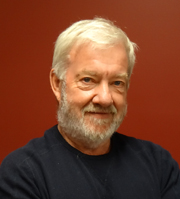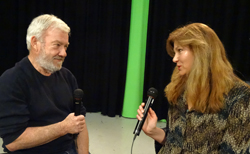Television - a 'sunset' industry
Author: Bruce Andrews
Publication Date: Thursday, 10 Oct 2013
 When veteran news and current affairs director Mr Peter Meakin told Charles Sturt University (CSU) students that television is a 'sunset' industry, he wasn't referring to the time of day when most viewers tune in.
When veteran news and current affairs director Mr Peter Meakin told Charles Sturt University (CSU) students that television is a 'sunset' industry, he wasn't referring to the time of day when most viewers tune in.Mr Meakin, who addressed journalism students at the CSU School of Communication and Creative Industries in Bathurst on Tuesday 8 October, was alluding to the rapid and unpredictable scope and pace of technological change, particularly in the media, and to the uncertainty of future audience viewing trends.
"Thirty years ago, TV was a 'sunrise' industry, but now it's a 'sunset' industry," he said. "Who knows how we'll be receiving our news and entertainment thirty years from now?"
Mr Meakin recently accepted the role of executive director of TV news and current affairs at Chanel Ten, starting in February 2014, after three decades in this role at Channel Nine, and more recently at Chanel Seven since 2003.
He visited CSU this week to meet journalism students and participate in an 'In Conversation' question and answer session led by lecturer in journalism, Ms Kay Nankervis.
Asked 'what makes a good journalist?', he praised the calibre of CSU journalism graduates over many years, noting as examples CSU alumni Ms Anna Coren and Mr Hamish Macdonald.
"Anna is a good journalist and a very nice person and she's persistent, she keeps trying," he said. "That's one of the keys for any journalist; to keep going, keep going no matter what. If you give up, someone else will get the story in your place and the news director or executive producer will make a mental note that you shouldn't be given the tough stories in the future. Determination and the ability to accept set-backs is really, really important."
 Ms Nankervis asked Mr Meakin for examples of the type of stories that made him proudest as a journalist.
Ms Nankervis asked Mr Meakin for examples of the type of stories that made him proudest as a journalist."I was asked that recently, and I didn't have any in particular, as they all tend to fuse into one after a while," he said. "There are certain subjects I love and they're not the obvious ones, like car crashes and fires. Human interest stories, about carers in particular ... there are a lot of people going through very, very traumatic personal circumstances that make incredible stories for television, and I think that we overlook them. It's a great reward to do those kinds of stories, and the audience loves stories with 'heart'. Most good stories have 'heart'."
Mr Meakin said journalists need to be complex in the way they tell stories these days.
"There's more than one way to tell a story, and there's more than one type of story. Any news organisation, whether it's a newspaper or a television station, needs to have a varied menu. And it needs to have a heart; if you don't have compassion, you won't have an audience most of the time."
Responding to student questions about how best to apply for journalism jobs with TV networks, he said, "Too many people come out of journalism (education) institutions who all write and talk the same way. We've got to get away from that. It's our unique qualities and abilities that are going to give us a future and this business a future. Journalists should be like terriers or greyhounds; there's the rabbit, go and chase the bloody thing."
He said that if he receives impressive examples of actual news reporting by graduate job applicants, it gives them an immediate advantage over standard written applications.
"That's what's going to make you stand out from your competitors, it's the quality of your delivery, not what's written on a piece of paper. Most CVs don't stand out; they're name, rank, serial number, and ' ... I've always had an interest in the media'. It's the ones that are different that register (with me), so be different."
Another student sought Mr Meakin's opinion about the state of TV current affairs programs.
"Shows like A Current Affair and Today Tonight cater to a particular audience," he said. "There's no doubt they've cut corners occasionally, but I don't see anything wrong with tabloid television, provided the facts are right. If any story is distorted it shouldn't be telecast, it shouldn't even be commissioned. The thing about television now, more so than the past, is that there are lots and lots of sources of programs, such as BBC World News and Al Jazeera. Today Tonight and A Current Affair are different to those but we also have to bear in mind that they are more popular. The (ABC's) 7.30 Report has done a pretty good job, particularly recently with Leigh Sales, but half the number of people watch that than do A Current Affair and Today Tonight. ... We tend to judge Today Tonight and A Current Affair on the occasional atrocity rather than their regular output. I reckon, 'Long live diversity'."
.jpg) Asked by a student to outline some of the difficulties of the news reporter's job and what they have to work against, Mr Meakin said that a lot of the people journalists want to talk to don't want to talk to journalists.
Asked by a student to outline some of the difficulties of the news reporter's job and what they have to work against, Mr Meakin said that a lot of the people journalists want to talk to don't want to talk to journalists."There is a very, very high quotient of salesmanship in journalism, and if you've got charm and can talk the birds out of the trees, figuratively speaking, then that's a great asset," he said. "Someone like (veteran TV journalist) Mike Munro has incredible charm, and where other journalist will be knocked back, Mike will be welcomed with a cup of tea and will be a friend for life. That's not because of any deceit on his part, it's because he has personal charm and the person wants to talk to him and no-one else.
"So, don't under-estimate the importance of using your personal qualities on people you deal with, and deal with them straight. You should also expect knock-backs, but if you're not persistent and not prepared for the occasional 'kick-in-the-teeth', you're probably in the wrong job. You're not going to win a popularity contest all your lives."
ends
Media contact: Bruce Andrews, (02) 6338 6084
Media Note:
Mr Peter Meakin spoke with journalism lecturer Ms Kay Nankervis and journalism students in the TV Studio at the Media Centre of the CSU School of Communication and Creative Industries in Bathurst from 1pm to 2pm on Tuesday 8 October.
